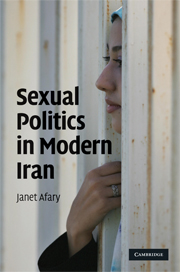Book contents
- Frontmatter
- Contents
- List of illustrations
- Acknowledgments
- Map of Iran
- Introduction
- Part 1 Premodern practices
- Part 2 Toward a Westernized modernity
- Part 3 Forging an Islamist modernity and beyond
- 9 The Islamic Revolution, its sexual economy, and the Left
- 10 Islamist women and the emergence of Islamic feminism
- 11 Birth control, female sexual awakening, and the gay lifestyle
- Conclusion: Toward a new Muslim-Iranian sexuality for the twenty-first century
- Glossary
- Bibliography
- Index
11 - Birth control, female sexual awakening, and the gay lifestyle
Published online by Cambridge University Press: 05 June 2014
- Frontmatter
- Contents
- List of illustrations
- Acknowledgments
- Map of Iran
- Introduction
- Part 1 Premodern practices
- Part 2 Toward a Westernized modernity
- Part 3 Forging an Islamist modernity and beyond
- 9 The Islamic Revolution, its sexual economy, and the Left
- 10 Islamist women and the emergence of Islamic feminism
- 11 Birth control, female sexual awakening, and the gay lifestyle
- Conclusion: Toward a new Muslim-Iranian sexuality for the twenty-first century
- Glossary
- Bibliography
- Index
Summary
In The History of Sexuality Michel Foucault argues that beneath a variety of sexual prohibitions of seventeenth-century European societies a “veritable discursive explosion” around sexuality could be discerned ([1976] 1980, 17). At the end of the eighteenth century, sexual regulations had become ingrained in legislative discourse, and state intervention addressed numerous issues concerning sexual conduct, among them the legal age of marriage, the birth rate, fertility, and the frequency of sexual relations. Through its economic, legal, medical, and health policies, the modern state influenced the sexual conduct of its population in new ways, resulting in dramatic demographic changes. By the nineteenth century, a broader discourse on sexuality was taking shape beneath the blanket of Victorian morality. It was nothing less than “an apparatus for producing an ever greater quantity of discourse about sex, capable of functioning and taking effect in its very economy” (Foucault [1976] 1980, 23). Foucault's interpretation of course contradicted the common assumption of an absence of discussion of sexuality in the nineteenth century and a presumed “Victorian morality,” followed by greater sexual freedom in the twentieth century.
Considered alongside trends concerning gender and sexuality in post-revolutionary Iran, Foucault's portrait of sexuality in the Victorian era offers valuable insights. Foucault can shed light on the repercussions of the new sexual austerities that were imposed after the revolution. In the 1980s the Islamist government instituted a dramatic reversal in human rights, especially regarding women's rights.
- Type
- Chapter
- Information
- Sexual Politics in Modern Iran , pp. 323 - 359Publisher: Cambridge University PressPrint publication year: 2009



